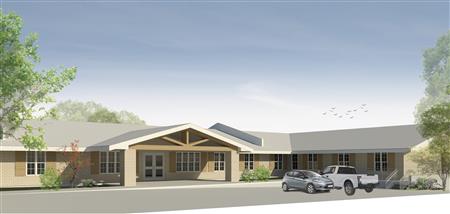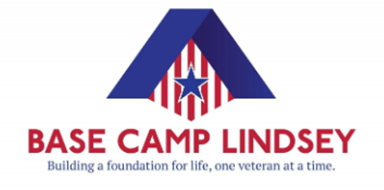
SW Rotary of Wichita Falls welcomed Tara Bryant, Board Chair for North Texas Veteran’s Relief Fund and Chris De La Garza, Vice Chair for the Board to our August 30th meeting.
Chris gave us an overview of Base Camp Lindsey, a holistic approach to solving homelessness. Following a model currently working in over 50 communities across the country – from New Orleans, to Kansas City – this approach targets the 70+ homeless Veterans living in Wichita county as well as surrounding counties in North Texas.
Click photo above to learn more about the North Texas Veterans Relief Fund
Instead of addressing only the homelessness, this model seeks to solve the root cause of that homelessness. This reduces recidivism in that it is a long-term solution to the overall cause rather than a temporary solution for only one symptom of the problem.
Our vision leverages connections with community partners like United Regional Health Care System, Catholic Charities, and Red River Hospital to help our Veterans address their needs whether it is medical, mental health, substance abuse treatment, or simply being able to access the benefits they have already earned.
The Base Camp Lindsey Case Manager, working with the Veteran, creates a care plan of goals that provides stability and independence for each individual. The community partners provide necessary treatment. Once the Veteran has achieved their goals, the case manager will stay in contact over the following six months as the Veteran transitions to permanent housing.
The Base Camp Lindsey program Step One to eliminating Veteran Homelessness is the building at 1908 6th Street. This is an empty nursing home we purchased from the city with the goal of being able to open quickly and being able to provide services to our Veterans sooner rather than later. The building is solid and the current layout fits into the program very well by providing 25 individual rooms for our veterans, common areas such as a kitchen, living area, and Class/Meeting room. It provides space for offices for the case managers who will work one on one with each Veteran tailoring the program to meet their unique individual needs as well as an available office for outside professionals to use for appointments.
Step Two is our Tiny Home Community. The tiny home community will function just like Step One in all the services offered to the Veteran, but they will have greater privacy and autonomy in their own tiny home rather than in the boarding house style facility on 6th Street. Because the tiny homes will be built on undeveloped land, infrastructure costs and timelines are greatly increased compared to those of Step One.
Longer term, Base Camp Lindsey sees a Step Three is to address the needs of those Veterans who will never be able to live independently due to either a mental or physical disability but are not ready or are unwilling to enter a long-term care facility. These Veterans will need to have staff keeping an eye on them, making sure they are fed and safe and have access to the medical and mental health care that they need while still retaining their independence. The reality is that some of these Veterans will die with us, and that’s okay. They won’t die on the street, and they won’t die alone.
The goal of Step One is to open as soon as possible. The facility is 13,888 square feet with a solid foundation and basic structure. It needs few repairs and only minimal changes to the floor plan. The main needs of this building are the mechanical systems. Due to vandalism and the effects of time we will need to update and replace the electrical system, plumbing, HVAC, and fire suppression system. Minimal new construction will include creating ADA accessible restrooms and shower areas, a common use laundry area and kitchen, storage areas and replacement windows and doors throughout the facility.
The facility will house 25 individual veterans in a residential style facility. Each Veteran will have their own room with access to common areas like shower rooms, kitchen, dining and living areas. Because it is residential and we will contract out services like medical and counseling, the building is considered a residential building negating the need for health department or other commercial code and licensing requirements.
Our construction budget is $605,000 and is variable depending upon the level of donated or reduced cost services and materials. This cost does include a contingency allowance to account for any unexpected construction or permitting expenses that occur during construction.
Funding is required for the renovation, separate from the annual operations costs. Our funding sources for Base Camp Lindsey renovation are grants, private donations, and sponsorships by local businesses and other community organizations. About 25% of the renovation costs have been raised so far.
Operations and ongoing sustainment will be funded by grants from the Texas Veterans Association, Per Diem grants from the Veteran’s Administration, a sustaining donor program, ongoing fundraising events, and continued grant-writing.
We don’t want this to just be our mission and vision and project. We want stakeholders throughout the entire eleven county community of North Texas to bring an end to Veteran homelessness in our area. We would welcome Work Services Corporation as a partner in this Mission.
Click here to download a trifold describing the Base Camp Lindsey Project
